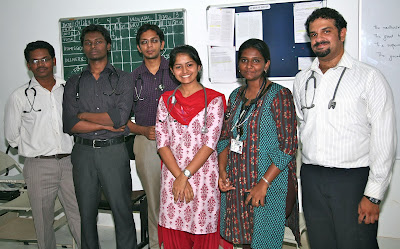I have had some meaningful conversations with medical students of different years in their course in the recent weeks. I met a friend yesterday who finished his junior residency and is now preparing for his post graduate entrance test. He spoke about the good days of studentship.
One theme of the conversation with some students has been the the attitude during the student days: 'Are we just medical students or doctors in training'!
The undergraduate medical education syllabus is being revised now after 20 or so. Looking at a glance, one gets the feeling that there is considerable emphasis in the new curriculum on enhancing skills, attitude, communication, ethics, behaviour, etc. This inclusive approach to integrate knowledge, skills and values seem to be an appropriate way forward.
The temptation of students is to look at their counter parts in science and arts colleges and replicate the orientation to life, arts, sports, activities, which while are valuable assets in the learning and growing process, seem to be dominated by fun, pleasure, achievements, competition, etc. The medical students can feel tempted to have the first two or three years to live and behave equivalent to what their counter parts do in the arts and science college, without necessarily being conscious of the option they choose to be 'doctors in training'.
When one choose to be a doctor in training, there is a value based commitment we are called to make which is consistent with the 'noble practices' in the practice of medicine: to value others, to learn and acquire skills in the art and science of practice of medicine, conduct and behaviour rooted in honesty and integrity, embrace a way of life where service and altruism become the inner orientation, living the vocation of self giving and team work, etc.
I have considerable admiration for the students in the MOSC Medical college, because they have a visible expression of their consciousness of the needs of the less privileged through the different activities they do through their social service programme. It is highly commendable.
At the same I feel concerned by the way they make their learning 'mundane' or 'casual' with a subscription to read 'small' books and 'condense their study' to the immediate period before the examination. Now the exit examination does not decide their merit for post graduate entrance, but the NEET which is decisive, I wonder whether teachers and students would collaborate to make learning 'intense', regular, and aspirational!
One practice that might install this orientation is to have students attached to the clinical and preclinical departments as 'shadow learners' by being involved in all the activities of the clinical and para-clinical services. I wonder whether it is the right time to think of bringing the 'tutorial system' when students are attached to a clinician for a few weeks during which period, the learning focus transcends the requirement of preparation for the examinations! The emphasis is not even to prepare for students just for he NEET, but make them learning motivated that the self directed learning inherent with study and practice of medicine would get incorporated as the 'mind set' among students and teachers.
I watched this bunch of bananas in our garden shown in the above photographs, from the time it first appeared in the plant. Over three weeks the full bunch of bananas appeared from out its wrappings. As I wait another two months it would be fully ready to be a bunch of fruit. From the time a banana plant is planted till it gives its fruit, it is about 15 months which is the gestation time a farmer would offer for the plant to grow and bear fruit.
Remember, there is something more in the wrapping of the banana when the first row of banana appears outside.
This to me is the metaphor with which we are called to view medical students. They grow under the watch of the teachers and the institution where they study and the hostels where they live ! There is 'more to come' in their lives if only we have planned individualised programme for their personal formation!
A student becomes a doctor not just studying subjects but becoming a person oriented to seek the welfare of wellness of others. This is FORMATION of a doctor in training!
M.C.Mathew (text and photo)







